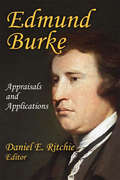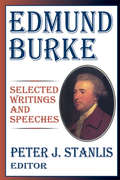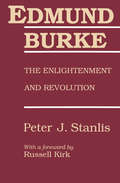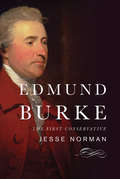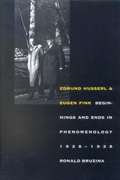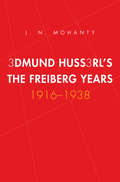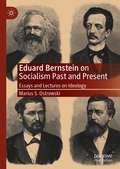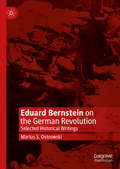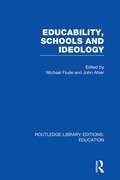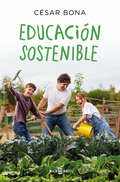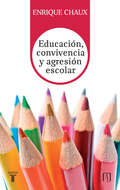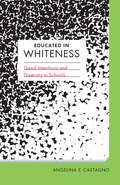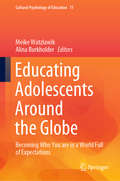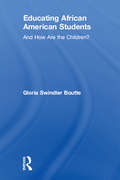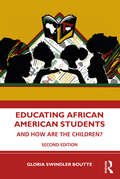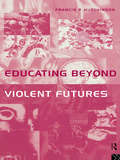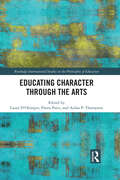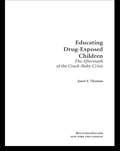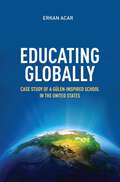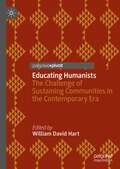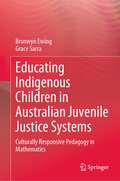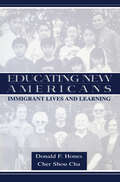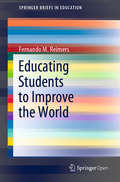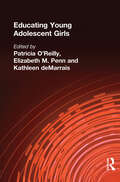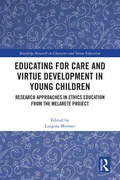- Table View
- List View
Edmund Burke: Appraisals and Applications (Library Of Conservative Thought Ser.)
by Daniel E. RitchieThe eighteenth century remains contemporary more than 200 years later because the fundamental questions raised then about politics in both the American and French Revolutions still speak to us. The writings of Edmund Burke on these and other political events of his time are today acknowledged as the basis of modern conservative thought. This volume brings together an outstanding collection of interpretative essays on Burke, and serves as a basic introduction to this seminal thinker.A member of the British Parliament from 1766 to 1794, Edmund Burke had sympathized with the American War of Independence and argued for reform of British policy toward Ireland and India, but he surprised many of his friends by his early, vehement opposition to the French Revolution. This volume brings together assessments of these and other statements by Burke by contemporaries such as Samuel Taylor Coleridge and William Hazlitt, along with essays by Irving Babbitt and Russell Kirk, who established his significance for twentieth-century conservatism.This is a collection of the best, previously published interpretive essays on Burke. It will be of interest to all those interested in the philosophical roots of conservatism, in the history of political thought, in revolution, and in modern political ideologies.
Edmund Burke: Essential Works and Speeches (The Library of Conservative Thought #Vol. 1)
by Peter StanlisIn this unique book, Peter J. Stanlis, the leading Burke scholar in America, has collected all the most important works and speeches of Edmund Burke (1729-1797), British statesman, political philosopher, and founder of modern conservative thought and, with due care to preserve the beauty of Burke's prose, edited them down to their essentials."The main purpose of these selections," Stanlis explains, "is to present extensive and in the main unbroken samples of Burke's most representative thought in his most characteristic style, on a great variety of subjects."In this major effort you can find--to name only a few topics covered--Burke's defense of ordered liberty, his advocacy of secure property rights, his love of Christianity and Europe's moral tradition, and his impassioned jeremiad against the orgy of destruction that the French Revolution became. Stanlis's general introduction gives important insight into Burke's early life, education, professional training, literary and political career, prose style, political philosophy, and more. In addition, each selection is preceded by a headnote that clarifies the selections in their historical context and includes a brief analytical interpretation. A chronology highlights important dates in Burke's life and career.In its compactness and comprehensiveness, this volume is the quintessential Burke reader. It will be of interest to historians, political scientists, and students of literature and intellectual history.
Edmund Burke: The Enlightenment and Revolution (The Library of Conservative Thought #Vol. 1)
by Peter J. StanlisTwo centuries after Edmund Burke published his Reflections on the Revolution in France, his name and reputation stand alongside Locke, Montesquieu, and Hume - the other still-cited grand political thinkers of the eighteenth century. For those great nations that have fallen into what Burke called "the antagonist world of madness, discord, vice, confusion and unavailing sorrow," the work of Burke supplies that sense of order, justice and freedom the present age seems to require.This volume by Peter Stanlis has grown out of almost four decades of studying Burke. Today, Professor Stanlis is called by Russell Kirk "the leading American authority on the political thought of the great conservative reformer." The book is divided into three categories: Burke on law and politics; Burke's criticism of Enlightenment rationalism and sensibility; and Burke's theory of revolution and critique of the English revolution of 1688.Stanlis' reasons' for linking Burke to the English Revolution rather than the later, and admittedly more decisive American and French Revolutions of his own time, is that for Burke, that earlier event was the normative pivot for judging how to make important changes in civil society. Indeed, even in his writings on the contemporary revolutions of his time,. Stanlis reminds us that Burke interpreted revolutionary events in France and Americas through the prism of the bloodless Revolution of 1688.
Edmund Burke: The First Conservative
by Jesse NormanEdmund Burke is both the greatest and the most underrated political thinker of the past three hundred years. A brilliant 18th-century Irish philosopher and statesman, Burke was a fierce champion of human rights and the Anglo-American constitutional tradition, and a lifelong campaigner against arbitrary power. Once revered by an array of great Americans including Presidents Theodore Roosevelt and Woodrow Wilson, Burke has been almost forgotten in recent years. But as politician and political philosopher Jesse Norman argues in this penetrating biography, we cannot understand modern politics without him. As Norman reveals, Burke was often ahead of his time, anticipating the abolition of slavery and arguing for free markets, equality for Catholics in Ireland, responsible government in India, and more. He was not always popular in his own lifetime, but his ideas about power, community, and civic virtue have endured long past his death. Indeed, Burke engaged with many of the same issues politicians face today, including the rise of ideological extremism, the loss of social cohesion, the dangers of the corporate state, and the effects of revolution on societies. He offers us now a compelling critique of liberal individualism, and a vision of society based not on a self-interested agreement among individuals, but rather on an enduring covenant between generations. Burke won admirers in the American colonies for recognizing their fierce spirit of liberty and for speaking out against British oppression, but his greatest triumph was seeing through the utopian aura of the French Revolution. In repudiating that revolution, Burke laid the basis for much of the robust conservative ideology that remains with us to this day: one that is adaptable and forward-thinking, but also mindful of the debt we owe to past generations and our duty to preserve and uphold the institutions we have inherited. He is the first conservative. A rich, accessible, and provocative biography, Edmund Burke describes Burke’s life and achievements alongside his momentous legacy, showing how Burke’s analytical mind and deep capacity for empathy made him such a vital thinker#151;both for his own age, and for ours.
Edmund Husserl and Eugen Fink: Beginnings and Ends in Phenomenology, 1928-1938
by Ronald BruzinaEugen Fink was Edmund Husserl's research assistant during the last decade of the renowned phenomenologist's life, a period in which Husserl's philosophical ideas were radically recast. In this landmark book, Ronald Bruzina shows that Fink was actually a collaborator with Husserl, contributing indispensable elements to their common enterprise. Drawing on hundreds of hitherto unknown notes and drafts by Fink, Bruzina highlights the scope and depth of his theories and critiques. He places these philosophical formulations in their historical setting, organizes them around such key themes as the world, time, life, and the concept and methodological place of the "meontic," and demonstrates that they were a pivotal impetus for the renewing of "regress to the origins" in transcendental-constitutive phenomenology.
Edmund Husserl's Freiburg Years 1916-1938
by J. N. MohantyIn his award-winning book The Philosophy of Edmund Husserl: A Historical Development, J.N. Mohanty charted Husserl's philosophical development from the young man's earliest studies--informed by his work as a mathematician--to the publication of his Ideas in 1913. In this welcome new volume, the author takes up the final decades of Husserl's life, addressing the work of his Freiburg period, from 1916 until his death in 1938. As in his earlier work, Mohanty here offers close readings of Husserl's main texts accompanied by accurate summaries, informative commentaries, and original analyses. This book, along with its companion volume, completes the most up-to-date, well-informed, and comprehensive account ever written on Husserl's phenomenological philosophy and its development.
Eduard Bernstein on Socialism Past and Present: Essays and Lectures on Ideology
by Marius S. OstrowskiThis book presents six major texts and selected shorter writings by the social-democratic thinker and politician Eduard Bernstein, translated into English for the first time: Socialism Past and Present; The Social Doctrine of Anarchism; Social Liberalism or Collectivism?; How is Scientific Socialism Possible?; What is Socialism?; The Socialisation of Enterprises; and articles from the periodicals Neue Zeit and Sozialistische Monatshefte alongside several unpublished manuscripts. Written over the period 1893 to 1931, these works focus on socialism as an ideology, and trace debates about ethics, social science, and class struggle that preoccupied the early-20th-century socialist movement. Bernstein carefully demarcates the boundaries between socialism and its ideological rivals, contrasting its communitarian aspirations with individualistic liberalism and anarchism, and its adherence to democratic methods with the totalitarian violence of communism and fascism. He revisits the intellectual canon of socialist thought, recentring contributions by Ferdinand Lassalle, Karl Rodbertus, and other neglected figures alongside those of Karl Marx and Friedrich Engels. Urging socialists to seize the opportunities afforded by their growing political representation, Bernstein addresses the strategies needed to achieve progressive policy reforms, including the prospects for realising socialism with the foundation of the Weimar Republic. 'In this illuminating collection, Marius Ostrowski brings together several essays by Eduard Bernstein, spanning a forty-year period of activity and addressing the question of “what is socialism”. At a time of renewed reflection on the foundation and value of social democracy, engaging with the thought of one of its founding fathers will be immeasurably valuable for both supporters and critics.' —Professor Lea Ypi, London School of Economics, UK 'During his long life, Eduard Bernstein made a contribution of great significance to both the theoretical and political development of the left, emerging as a founding figure of European social democracy. In this splendid volume, Marius Ostrowski presents Bernstein’s writing in its full richness and complexity, bringing together his lucid translations into English of some of the major theoretical works published by Bernstein during the years of the Weimar Republic. This book makes a valuable contribution to our understanding of the development of the socialist tradition during a period of great political turmoil, and gives us a three-dimensional understanding of Bernstein’s contributions to socialism and social democracy.' — Dr Martin O’Neill, University of York, UK
Eduard Bernstein on the German Revolution: Selected Historical Writings
by Marius S. OstrowskiThis book presents two major texts and selected shorter writings by the social-democratic thinker and politician Eduard Bernstein, translated into English in full for the first time: The German Revolution: A History of the Emergence and First Working Period of the German Republic; How A Revolution Perished; and articles from Vorwärts and other socialist periodicals. Written in the aftermath of the 1918 German Revolution and the end of WWI, they address the overthrow of autocratic rule in Germany, and provide a live chronicle and retrospective assessment of the Weimar Republic’s foundation. Bernstein gives a detailed chronology of the German Revolution and its intellectual, economic, and political context, and offers a historical analogy in his account of the 1848 French Revolution, which differs in key respects from that of Karl Marx in The Eighteenth Brumaire of Louis Napoleon. Drawing on his own experience of the events he describes, he revisits the socialist debate over ‘reform or revolution’ that he himself had provoked at the turn of the 20th century, and consciously seeks to wrest ownership of the Revolution’s legacy away from the Spartacist and communist left. In these works, Bernstein exhorts social democrats to rally behind the nascent Republic and resist the siren-calls of its militant opponents on radical left and right, and he engages with themes of party unity, political violence, democracy, and the role of ideology that have echoed through left theory and strategy ever since.
Educability, Schools and Ideology (Routledge Library Editions: Education)
by John Ahier Michael FludeThe sociology of education has been at the forefront of new developments in sociological theory. This book examines and criticizes a number of these new developments and discusses some empirical work on issues of current concern. One of the few books that integrates radical and critical sociology into the field of education, it deals with the resultant difficulties. The topics covered include cultural deprivation, ideologies in education, classrooms, the teaching profession and the history of women’s education.
Educación sostenible
by César BonaPodríamos preguntarnos si este es el mundo que vamos a dejar a las futuras generaciones, pero este no es un libro sobre lo que va a pasar en el futuro, es un libro sobre el presente. La educación es la pieza clave para cuestiones tan actuales como la sostenibilidad o el cambio climático. Invitemos a niños y niñas a que sean los principales protagonistas de un cambio en el cual nosotros, adultos, tenemos que ser los primeros en creer. Así que demos el paso y sirvamos de ejemplo. Preguntémonos: «¿Qué puedo hacer yo?» y, sobre todo, «¿Qué podemos hacer juntos?» En casa, en la escuela, de forma individual y en grandes equipos. Pequeños gestos y acciones del día a día han de provocar ese cambio. Hemos de actuar, no por miedo a qué pasará si no lo hacemos sino porque con nuestras acciones estaremos respetando el lugar donde vivimos, nuestra casa. César Bona (Ainzón, Zaragoza, 1972). Maestro y escritor. Licenciado en Filología Inglesa y Diplomado en Magisterio en Lengua Extranjera por la Universidad de Zaragoza. «Las puertas de las escuelas han de estar abiertas, no solo para que entren los niños y las niñas sino para que sus ideas salgan y transformen el mundo». Pensamientos como este son los que le llevaron al Congreso Mundial por los Derechos de la Infancia, en el XXV Aniversario de la Convención de los Derechos del Niño. Por sus múltiples proyectos vinculados a la participación infantil recibió el Premio Magister de Honor por la Plataforma de la Escuela Pública, el Premio Crearte del Ministerio de Cultura en dos ocasiones por estimular la creatividad, así como también la Cruz José de Calasanz, máxima distinción en la educación aragonesa o el Premio Medio Ambiente Aragón 2013. Además, obtuvo la Mención de Honor en el International Children Film Festival of India, por la película de cine mudo The importance of being an Applewhite, que consiguió unir a dos familias que no se hablaban. Y tras dieciséis años de trayectoria, fue nominado como uno de los 50 mejores maestros del mundo según el Global Teacher Prize (2014). Ha formado parte del jurado de los premios Princesa de Asturias, en la categoría de Comunicación y Humanidades, en 2017, 2018 y 2019. Entresus libros destacan La nueva educación (2015), Las escuelas que cambian el mundo (2016), La emoción de aprender (2018) y Humanizar la educación (2021), libros que ahora sirven de referencia en muchas universidades. Además, para niños ha escrito Derechos y deberes de la Infancia (2019), El asombroso mundo de Bernardo (2018) y una adaptación del Quijote (2017).
Educación, convivencia y agresión escolar
by Enrique ChauxUna investigación sobre problemas que afectan a los jovenes.
Educated in Whiteness: Good Intentions and Diversity in Schools
by Angelina E. CastagnoEducators across the nation are engaged in well-meaning efforts to address diversity in schools given the current context of NCLB, Race to the Top, and the associated pressures of standardization and accountability. Through rich ethnographic accounts of teachers in two demographically different secondary schools in the same urban district, Angelina E. Castagno investigates how whiteness operates in ways that thwart (and sometimes co-opt) even the best intentions and common sense—thus resulting in educational policies and practices that reinforce the status quo and protect whiteness rather than working toward greater equity.Whereas most discussions of the education of diverse students focus on the students and families themselves, Educated in Whiteness highlights the structural and ideological mechanisms of whiteness. In schools, whiteness remains dominant by strengthening and justifying the status quo while simultaneously preserving a veneer of neutrality, equality, and compassion. Framed by critical race theory and whiteness studies, this book employs concepts like interest convergence, a critique of liberalism, and the possessive investment in whiteness to better understand diversity-related educational policy and practice.Although in theory most diversity-related educational policies and practices are intended to bring about greater equity, too often in practice they actually maintain, legitimate, and so perpetuate whiteness. Castagno not only sheds light on this disconnect between the promises and practices of diversity-related initiatives but also provides insight into why the disconnect persists.
Educating Adolescents Around the Globe: Becoming Who You Are in a World Full of Expectations (Cultural Psychology of Education #11)
by Meike Watzlawik Alina BurkholderBy traveling to different parts of the world, this book provides a multidisciplinary perspective on the current state of adolescent education and demonstrates how education systems are formed by and closely tied to culture. After establishing a theoretical background, the book delves into the particulars of adolescent education and its associated challenges in six countries (India, Kenya, Germany, Brazil, Japan, and Denmark). In tandem with the discussion of institutions, the stories of those who are all too often underserved or left behind are told. Despite the diversity of each education system, the investigation reveals several unifying themes that transcend the specific contexts. The lessons from each example are woven together to demonstrate how the individualized needs of students can best be met, in a vision for the future of educating adolescents."
Educating African American Students: And How Are the Children?
by Gloria Swindler BoutteFocused on preparing educators to teach African American students, this straightforward and teacher-friendly text features a careful balance of published scholarship, a framework for culturally relevant and critical pedagogy, research-based case studies of model teachers, and tested culturally relevant practical strategies and actionable steps teachers can adopt. Its premise is that teachers who understand Black culture as an asset rather than a liability and utilize teaching techniques that have been shown to work can and do have specific positive impacts on the educational experiences of African American children.
Educating African American Students: And How Are the Children?
by Gloria Swindler BoutteThis straightforward and reader-friendly text provides strategies for P-12 educators who are interested in ensuring the cultural and academic excellence of African American students. It presents a careful balance of published scholarship, a framework for culturally relevant teaching, and research-based cases of teachers who excel at teaching Black children. Examples from multi-ethnic teachers across P-12 grades and content areas (e.g., ELA, science, mathematics, social studies, arts) are presented so that others can extrapolate in their respective educational settings. This book explains Black culture, anti-Black racism, African Diaspora Literacy, African American Language, and pro-Black and actionable steps that educators can adopt and implement. Examples of culturally relevant family and community involvement are provided. As with the previous edition, readers will appreciate a multitude of resources. After reading this book, educators will view educating African American students as exhilarating and rewarding and Black students will flourish.
Educating Beyond Violent Futures
by Francis HutchinsonAs we enter the Twenty-First Century, it is easy to assume that worsening trends in violence will be a feature of our lives, whether in our schools, our societies or as a species. Educating Beyond Violent Futures challenges assumptions that trends in violence are destiny, and raises crucial questions about choice and engagement. Drawing upon new research, this book is essential reading for those who want to prepare our children for living constructively in the next century
Educating Character Through the Arts (Routledge International Studies in the Philosophy of Education)
by Panos Paris Aidan P. Thompson Laura D’OlimpioThis volume investigates the role of the arts in character education. Bringing together insights from esteemed philosophers and educationalists, it looks to the arts for insight into human character and explores the arts’ relationship to human flourishing and the development of the virtues. Focusing on the moral value of art and considering questions of whether there can be educational value in imaginative and non-narrative art, the nine chapters herein critically examine whether poetry, music, literature, films, television series, videogames, and even gardening may improve our understanding of human character, sharpen our moral judgement, inculcate or refine certain skills required for virtue, or perhaps cultivate certain virtues (or vices) themselves. Bringing together research on aesthetics, ethics, moral and character education, this book will appeal to students, researchers and academics of philosophy, arts, and education as well as philosophers of education, morality, aesthetics, and teachers of the arts.
Educating Drug-Exposed Children: The Aftermath of the Crack-Baby Crisis
by Janet Y. ThomasThis is the first book to use teachers' experiences to understand how prenatal drug exposure affects children's' development , and how social construction of the problem influences perceptions within schools.
Educating Globally: Case Study of a Gulen-Inspired School in the United States
by Erkan AcarThe purpose of this case study is to describe the characteristics of a Gulen-inspired School (GIS) in the United States. The study identifies the dynamics of a US based GIS in terms of the school's curriculum, history, educational success, hiring practices, admission processes and networking. In order to understand its unique meaning and significance, interviews and observations were conducted in one GIS located in the northeast region of the United States. Gulen inspired schools are those founded around the world by the volunteers of the Gulen (or Hizmet) Movement. Gulen-inspired schools provide all levels of education (K-12 and college levels) in different educational systems. These schools are inspired by the educational philosophy of Fethullah Gulen, a Turkish-Muslim scholar living in the United States, and numbered around 1,000 in more than 150 countries throughout the world.
Educating Humanists: The Challenge of Sustaining Communities in the Contemporary Era (Studies in Humanism and Atheism)
by William David HartThis volume explores the challenges that humanists face from hostile religious traditionalists on its right flank and from the political antihumanism, which is often postsecular, of critics on its left flank. Given this dual challenge, how can "secular" humanism educate, sustain, and reproduce itself?
Educating Indigenous Children in Australian Juvenile Justice Systems: Culturally Responsive Pedagogy in Mathematics
by Bronwyn Ewing Grace SarraThis book addresses key issues in the context of the national policy of educating children accused of crimes in Juvenile Courts in Australia. For several decades, National and State Governments in Australia have struggled to define education, constantly seeking to improve the way society applies the concept. This book presents an accurate portrayal of consequences of the education policy of trying to educate troubled children and young people in trouble with the law. It describes the work of juvenile detention centre mathematics teachers and their teaching contexts. It portrays teachers as learners, who ventured with researchers with a theoretical perspective. This book focuses on culturally responsive pedagogies that seek to understand the ways Indigenous children and young people in juvenile detention make sense of their mathematical learning, which, until the time of detention, has been plagued by failure. It examines how the underperformance of Aboriginal and Torres Strait Islander students, and students from low socioeconomic backgrounds are strong determinants of their overrepresentation in the juvenile justice system in Australia. This book presents the argument that if the students’ literacy and numeracy levels can be improved, there is opportunity to build better futures away from involvement in the juvenile justice system and towards productive employment to improve life chances.
Educating New Americans: Immigrant Lives and Learning (Sociocultural, Political, and Historical Studies in Education)
by Donald F. Hones Shou C. Cha Cher Shou ChaEducating New Americans examines what it means to be an American through the history of a refugee from Laos. Shou Cha is a community liaison for an elementary school, an evangelical preacher, a community leader, a husband, and a father. His lifetime of learning, presented mainly in his own voice, is framed by various historical and sociological contexts that have shaped his life, the lives of other Hmong refugees, and the lives of other Americans, old and new. These contexts include the history of immigrant education policies in the United States, as seen through the lives of immigrant children; the historical and sociological impact of warfare as well as missionary work in the lives of the Hmong people; and the sociology of generational conflict, especially as it is felt among immigrant groups. Finally, this book suggests that immigrant parents such as Shou Cha can contribute to the process of teaching peace to children, and making peace between diverse groups in America, the land of e pluribus unum.
Educating Students to Improve the World (SpringerBriefs in Education)
by Fernando M. ReimersThis open access book addresses how to help students find purpose in a rapidly changing world. In a probing and visionary analysis of the field of global education Fernando Reimers explains how to lead the transformation of schools and school systems in order to more effectively prepare students to address today’s’ most urgent challenges and to invent a better future. Offering a comprehensive and multidimensional framework for designing and implementing a global education program that combines cultural, psychological, professional, institutional and political perspectives the book integrates an extensive body of empirical literature on the practice of global education. It discusses several global citizenship curricula that have been adopted by schools and school networks, and ties them into an approach to lead school change into the uncharted territory of the future. Given its scope, the book will help teachers, school and district leaders tackle the change management needed in order to introduce global education, and more generally increase the relevancy of education. In addition, the book offers a “bridge” for more productive collaboration and communication between those who lead the process of educational change, and those who study and theorize this important work.At a time when the urgency of our shared global challenges calls for more understanding and collaboration and when the rapid transformation of societies requires that we help students develop a clear sense of relevancy and purpose, this book offers a way to pursue deep and sustainable change in instruction and school culture, so that students learn that nothing human is foreign and that they can find meaning in lives aligned with audacious purposes to make the world better.
Educating Young Adolescent Girls
by Kathleen B. DeMarrais Elizabeth M. Penn Patricia O'ReillyThis text for preservice and in-service teacher education courses shows how schools can educate girls and promote their positive self-esteem at the same time. Its purpose is to help teachers facilitate the development of gender-equitable schools and classrooms. Taking a feminist developmental approach, the text draws on an interdisciplinary knowledge base, synthesizing research from psychology, anthropology, sociology, and education. While it is rooted in scholarly research, the focus is on clarifying the connection between theory and practice, with an emphasis on practical applications. The text is organized in two sections--"Growth and Development" and "Teaching and Learning"--and includes a variety of engaging pedagogical features. Underscoring the need for teachers, school administrators, and parents to become aware of the intersection of development and education, Educating Young Adolescent Girls: *combines gender, growth, and development; *demonstrates how schooling can facilitate the total development of young adolescent girls; and *addresses a multiplicity of issues, including adolescent girls of color and young adolescents girls' sexuality.
Educating for Care and Virtue Development in Young Children: Research Approaches in Ethics Education from the MelArete Project (Routledge Research in Character and Virtue Education)
by Luigina MortariThis book champions care education in early childhood school contexts, addressing the critical need for an effective and meaningful ethics education grounded in Platonic and Aristotelian reflections on virtues, and ultimately positing a theory of ethics education that connects ancient philosophy to contemporary care thinking.This theory is supported by the empirical findings of the MelArete Project, a 10-year research project in care and virtues education that guides children’s attention to the concepts of care and virtues. Unique amongst contemporary virtue and character approaches, Mortari and her colleagues have developed a rich research base that combines recent educational theories with ancient and continental philosophy.Ultimately arguing for an ethics education centered on care in the wake of our current ethical crisis, the book contributes to a growing body of literature on prominent virtue and character education programs around the world and will therefore appeal to scholars, researchers, and postgraduate students working in moral and values education, ethics education, and educational theory more broadly. Care ethicists and early childhood educators will also benefit from this volume.
